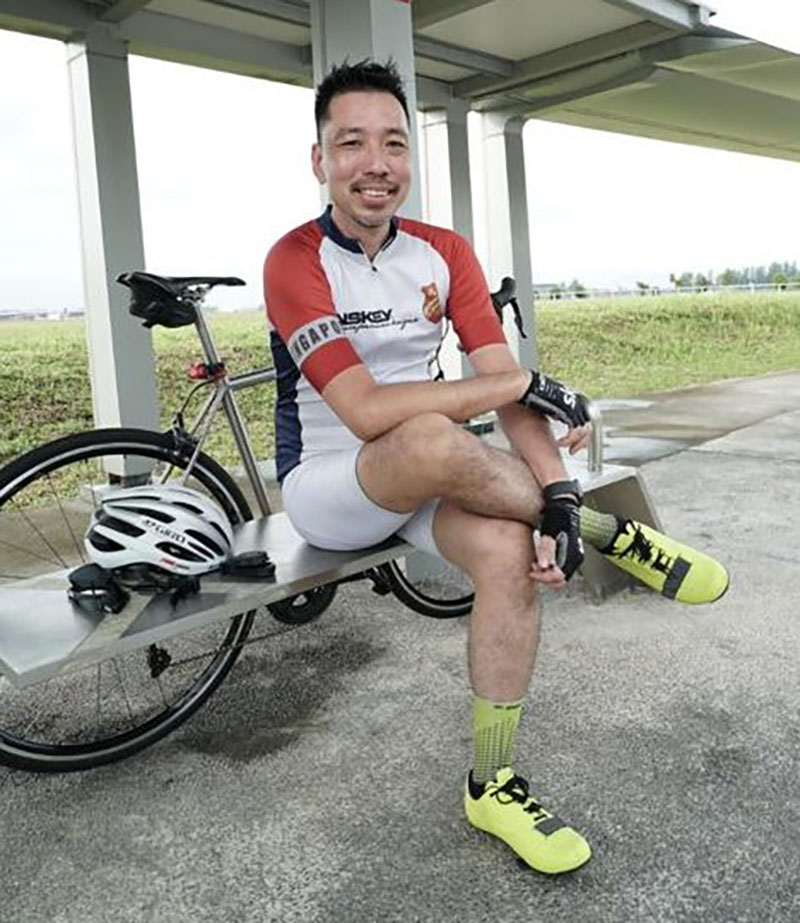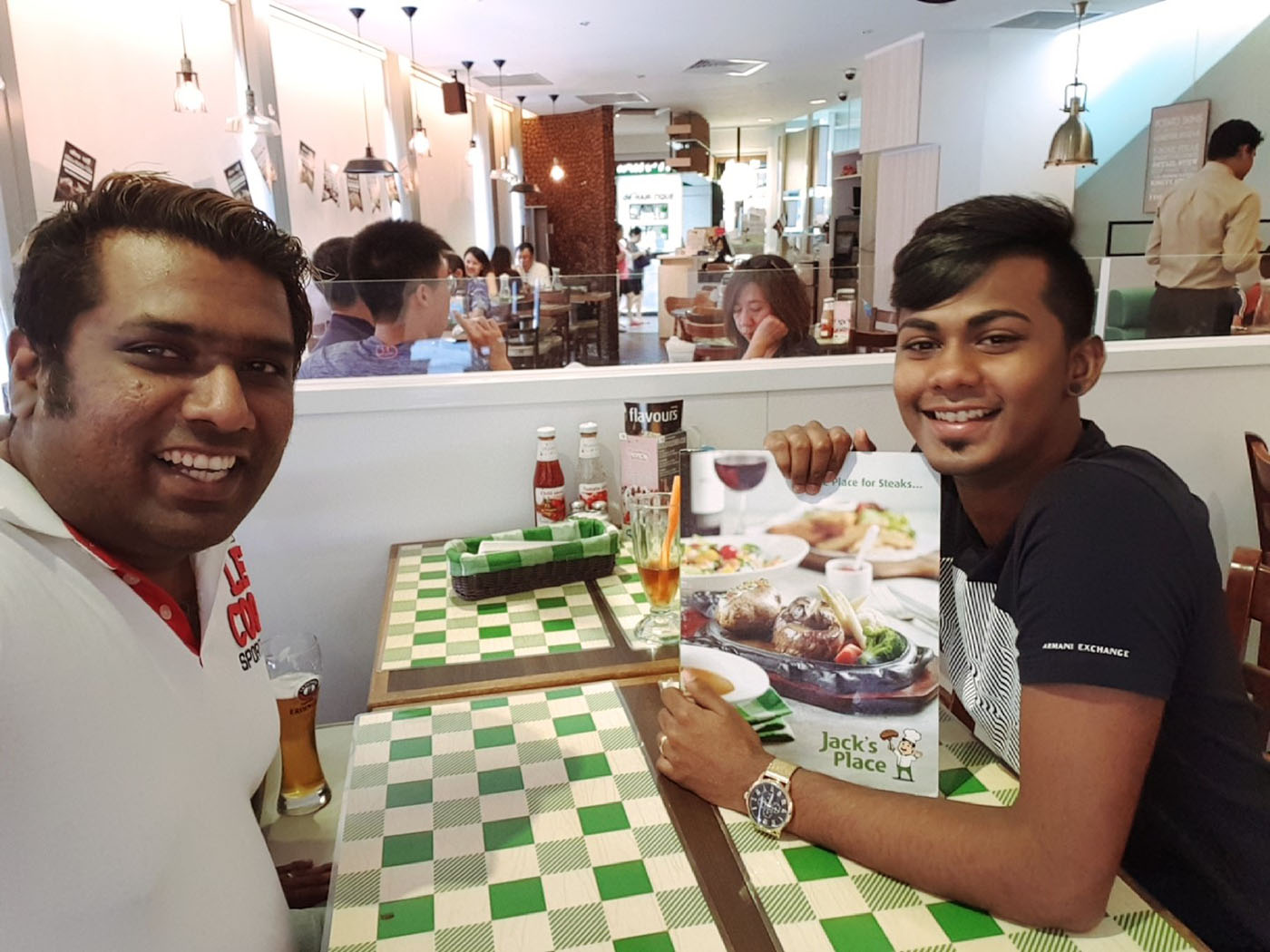
As part of the Singapore Prison Service’s Desistor Network, the ex-offenders offer friendship and support to newly released inmates looking to forge a better path.
TEXT: ANNIE TAN
PHOTOS: ANDREW ONG, BRUCE MATHIEU, DAVID KING THORAIRAJAN
Thrice a week, a small group of cyclists meet at Seletar Aerospace Park. They then cross the island together, covering distances of more than 50km on two wheels.
But this collective — known as Break The Cycle — is no mere hobbyist group. Founded in 2020, Break The Cycle is part of the Desistor Network launched in April 2023 by Singapore Prison Service (SPS), where 53 agencies work with ex-inmates to create a support ecosystem that steers them away from re-offending.
During cycling breaks and breakfast sessions, the cyclists chat about work, family, as well as their struggles and hopes for the future. They form a deep bond that often extends beyond cycling. The group’s co-founder, ex-offender Andrew Ong, sums up the clique: “We do life together.”
THE POWER OF CAMARADERIE

Approximately four in 10 former inmates return to prison within five years of release, according to SPS. Ong is part of a small but growing group of ex-convicts helping others navigate the challenging transition from prison life to reduce recidivism. The 45-year-old himself was sentenced to 30 months of imprisonment at the age of 18 for his involvement in a gang fight, though he only served nine months after a successful appeal. He shared that his parents’ divorce drove him to seek a sense of belonging in gangs.
However, after his release, he slipped back into his old lifestyle of drug consumption. An overdose at the age of 21 proved to be the wake-up call he needed to get clean. He worked hard to build his career and is now the director of partnership and strategic communications at HCSA Community Services — a charitable organisation that helps ex-offenders, abused teenage girls and single parents, among others. Knowing how easy it is to backslide into crime, Ong has been volunteering at church and halfway houses for many years to help others stay the course.

Such support makes a huge difference, says Bruce Mathieu. The 54-year-old joined a gang at the age of 13, quickly became hooked on heroin — an addiction with which he struggled for 30 years — and was imprisoned five times, serving 20 years in total.
Some 11 years ago while serving his fifth prison stint, he resolved to turn his life around for his then three-year-old daughter. Since his release in 2016, he has been giving talks at schools, organisations and public events, as well as mentoring newly-released inmates as an SPS volunteer. These include Tian Boon Keng, who was featured in the CNA documentary Inside Maximum Security.
“A common misconception about mentoring is that it involves a lot of counselling. But no, it involves being a friend in the true sense of the word — that’s it,” explains Mathieu, who still meets Tian at least once a month, and recently supported him when he shaved his head for Hair For Hope.
WHY IS IT SO EASY TO RE-OFFEND?

While prison life is known to be challenging, life after release from incarceration isn’t necessarily easy, and re-offending does occur. One possible reason for this is that many inmates find that they have fewer job opportunities upon release, especially those without a good education, notes David King Thorairajan, 41, who volunteers at prison chapel services and through prison befriender programmes.
Thorairajan joined a gang in his teens, got involved in violent fights and was imprisoned twice for a total of eight years, enduring 18 strokes of the cane. During his second sentence, he studied hard and completed his N-, O- and A-levels. Upon discharge, he enrolled at the Singapore Management University, graduating with a double major in psychology and human resources. Despite his qualifications, he had difficulty securing a good job, and eventually started his own life coaching and training company in 2012. Over the years, he has engaged, trained and mentored ex-offenders to coach at-risk youth in schools.

Before they can bounce back, get a job or study, they need to deal with their trauma and baggage – the hurt, disappointment, unforgiveness. There needs to be a major overhaul because there are patterns of thinking that need to be broken, otherwise the cycle will keep repeating.
Andrew Ong
Mathieu adds that drug addictions are hard to break. “Those who have never been addicted to drugs may think (that kicking a habit) is just a case of mind over matter. That is absolutely hogwash. Drugs rewire your whole brain, so that you cannot function without them,” says Mathieu. “It is very easy to fall back into addiction. If you veer off half a degree and don’t pull yourself back, in a matter of time, you will realise you are too far off,” he adds.
Despite these challenges, all three men agree that the most important factor to avoid re-offending is internal change. “People don’t understand that former offenders may have suffered trauma in their lives,” Ong says, adding that many sought solace in gangs because they come from broken families.
STRENGTHENING THE SUPPORT ECOSYSTEM

Mentorship under individuals with similar experiences is a powerful avenue to help ex-convicts resolve their internal conflict and drive positive change. “Because who better to know their problems than us? We’ve been through it and done that,” reasons Mathieu.
These individuals don’t just relate to their mentees on a personal level; they may also serve as a better sounding board than friends from their past life, who may still be involved in crime. Groups like Break The Cycle provide a safe and accepting community under which ex-offenders can thrive. One such individual is Ravin Sadanadan, whom Thorairajan hired as a coach in his company after mentoring him.
“David coached me to get back on my feet and gave me opportunities to reach out to other youths in need. I was so motivated to work with them and their families that I completed my diploma, degree and masters in psychology,” said Sadanadan, who is now a senior counsellor at a non-profit organisation.
Because who better to know their problems than us? We’ve been through it and done that.
Bruce Mathieu
Mentoring former offenders however, is not without its challenges, says Ong. “It’s not like distributing groceries or cleaning someone’s house – you don’t see the outcome immediately. There is a lot of backend work, and mentees can often misunderstand you.”
“You have to understand that these are things they project because of their childhood experiences and things that they are dealing with. You must be thick-skinned and not take it personally,” adds Ong, who recently reconnected and began cycling with a youth he had mentored more than 10 years ago.
Ong maintains that planting the seed of hope can start a positive and powerful cycle of change.
“Some of our cyclists have also volunteered to be befrienders with SPS, journeying with inmates for 12 months upon their release from prison,” he shares.
NAVIGATING LIFE AFTER PRISON
To help reintegrate former inmates into society upon their release, SPS works with Yellow Ribbon Singapore to offer support for job placement and retention, skills assistance subsidies and other education assistance. SPS also helps inmates to apply for financial assistance and provides addiction treatment to those in need of it. Community support is also extended to them via drop-in centres, self-help groups and befrienders, as well as family programmes and family resource centres to support bonding.
Like our stories? Subscribe to our Frontline Digital newsletters now! Simply download the HomeTeamNS Mobile App and update your communication preference to ‘Receive Digital Frontline Magazine’, through the app settings.

